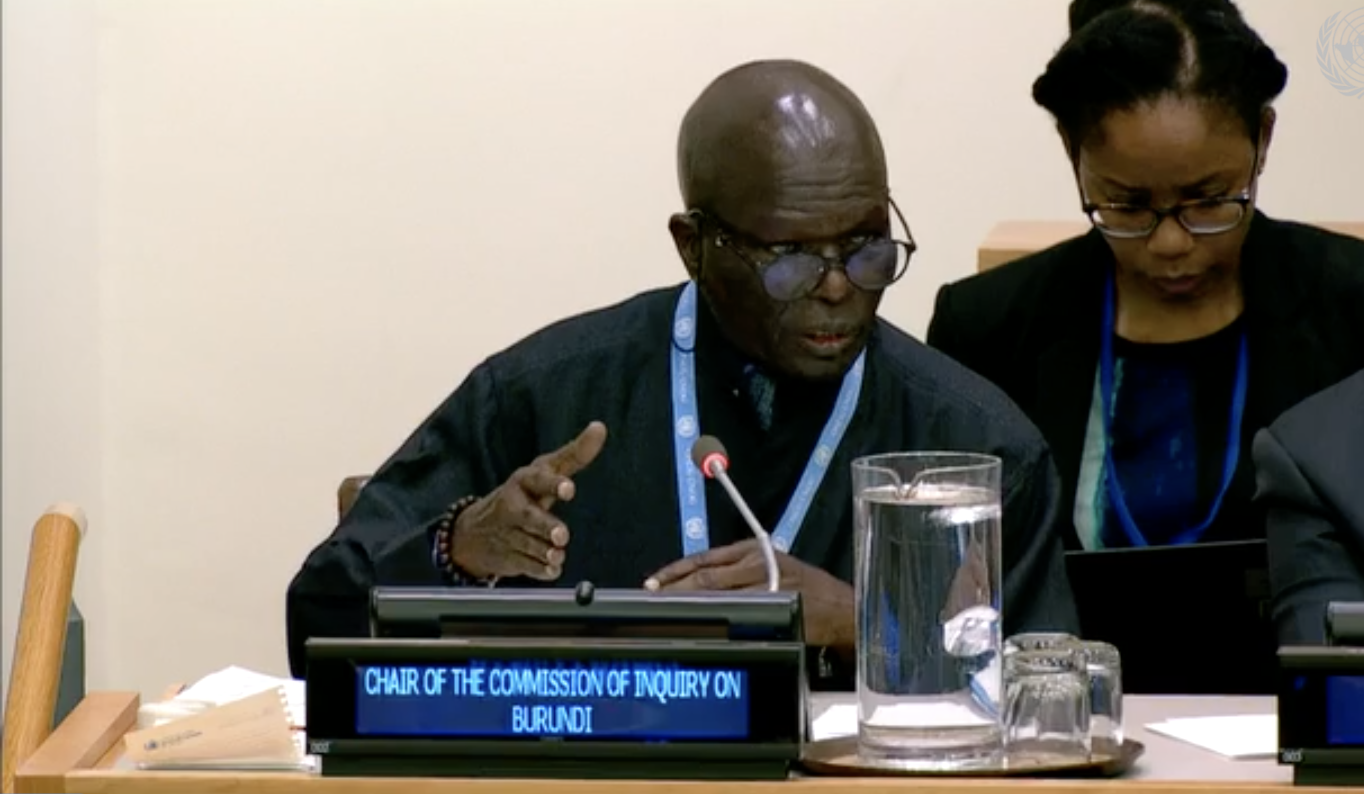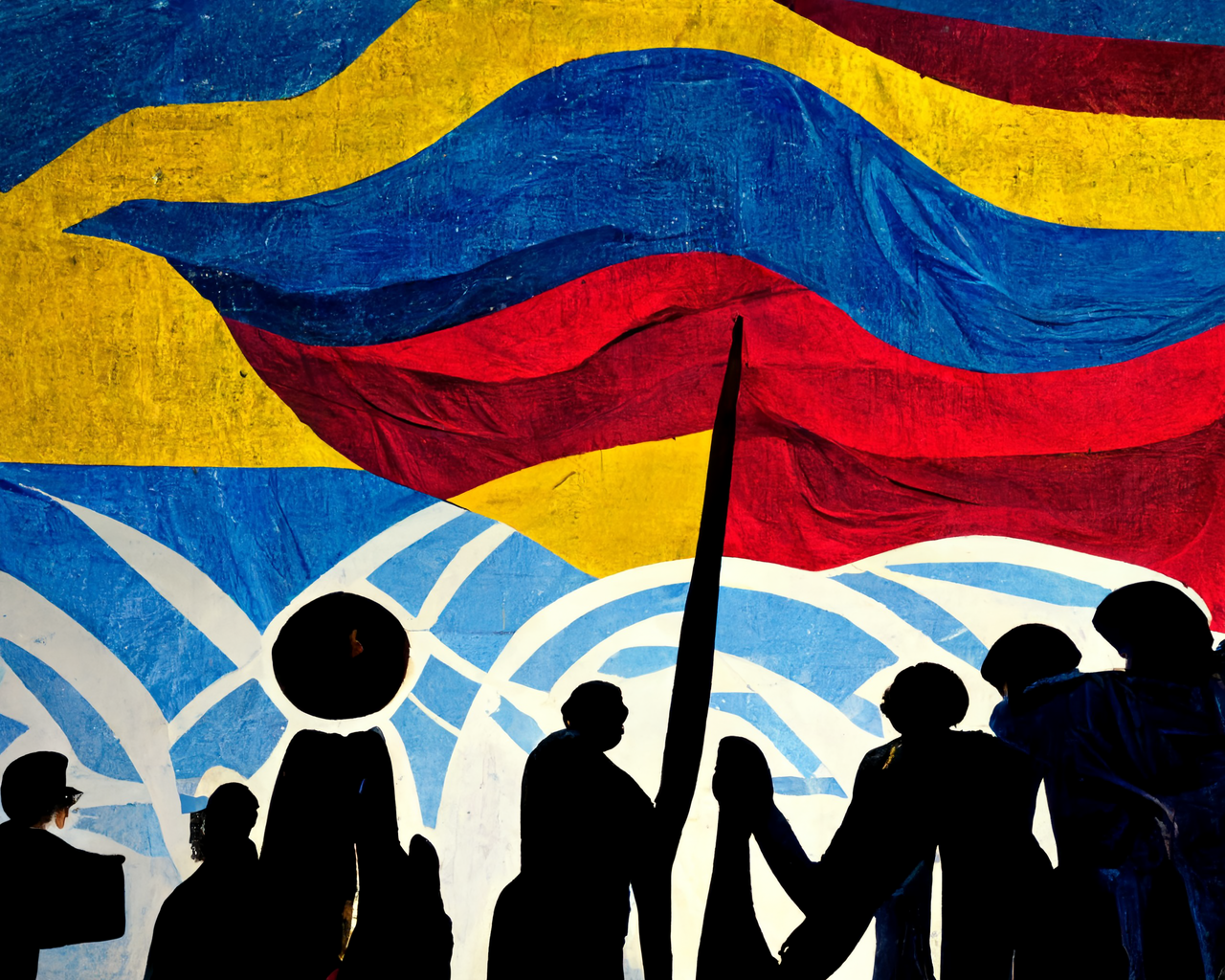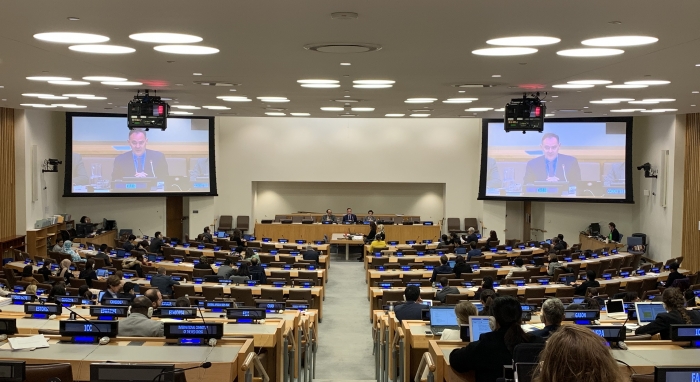Overview
The UN General Assembly’s human rights committee – the Third Committee – provides an opportunity once a year in New York for member States to promote the respect of human rights through the adoption of declarations and resolutions that speak to obligations, outline policy approaches and cite good practice in implementation. The Third Committee has just concluded its 2018 session. ISHR has monitored the session closely, advocating for positive references to the right to defend rights and for human rights systems to be made more effective.
‘This has been an intense session, where sovereignty has been much cited in clashes between States; where divergences in traditional State groupings have been exposed, and important statements and resolutions have been passed reaffirming fundamental freedoms,’ said ISHR’s Eleanor Openshaw.
Member States heard from 54 independent experts and adopted 57 resolutions, including one on freedom of peaceful assembly and association – a first for the Third Committee. It also considered the work of the Human Rights Council over the last year. Several key resolution negotiations and outcomes are outlined below.
This is not the end of the road for these resolutions, however. Costs of any activities and staffing included in these resolutions will now be considered by the General Assembly’s finance committee – the Fifth Committee – before all resolutions are finally signed off by the General Assembly Plenary in the third week of December.
States have the opportunity to change their mind on resolutions ahead of final decision-making by the Plenary. Now is the time to push for increased support for outcomes you seek.
Thematic Resolutions
Freedom of peaceful assembly and association – Introduced by the US as a one off, this Third Committee resolution is essentially an ‘omnibus’ text, drawing on language agreed in relevant General Assembly and Human Rights resolutions – including those related to human rights defenders and the safety of journalists. The new resolution speaks of the need to protect journalists and media workers, including when covering demonstrations, both online and offline. It condems violations and abuses against peaceful protestors on the basis of their political opinion or affiliation. The resolution does not specifically reference the work of the UN Special Rapporteur on Freedom of Peaceful Assembly and Association – a given in most such thematic resolutions. This, in the context of the US’ withdrawal from the Human Rights Council – the body that creates such rapporteurships.
During negotiations, the US withstood pressure to include a greater number of references to sovereignty and the importance of national laws, amongst other suggestions. A vote was called on the draft resolution by China, Russia, Bolivia, Venezuela, Iran, Belarus, Nicaragua and Syria. The text received strong cross- regional support however, with a final tally of 140 in favour, 0 against and 38 abstentions.
ISHR calls on States that voted against the resolution on freedom of peaceful assembly and association or abstained, to give this key resolution its support at the GA Plenary stage. Whilst the negotiation process during the Third Committee session could have allowed for greater input from interested parties, the final resolution is strong, and the thematic focus is an important one, in particular in an era of undue restrictions on the exercise and defence of the freedom of peaceful assembly and association.
Extrajudicial and arbitrary executions – A listing of those most vulnerable to extrajudicial and arbitrary execution in this resolution, became the focus of heated exchanges between States. This year, divisions between members of a State grouping resulted in a fracturing of the group position.
The Organisation of Islamic Cooperation (OIC) introduced an amendment to delete the listing. When Albania – an OIC member – made clear the amendment was not being presented in their name and, therefore, there was no group position, other States were able to break rank. This included Tunisia, Lebanon and Turkey. The amendment was defeated by a vote of 86 -50 with 25 abstentions.
ISHR’s Tess McEvoy welcomed the defence of the inclusion of the listing, which references people targetted because of their sexual orientation or gender identity, and human rights defenders.
‘By listing those most targeted by extrajudicial executions, you increase attention on the need for their protection,’ said McEvoy. ‘You also hope that impunity – all too common in regard to attacks against particular groups – is effectively challenged.”
A vote was then called on the overall text, to the dismay of lead negotiator Finland. ‘This resolution is about the right to life,’ said the Finnish Ambassador. The resolution was adopted, with the listing of those most vulnerable to extrajudicial executions included, 111-0 with 66 abstentions.
Right to privacy – Consensus was reached on this resolution calling on States to ensure their national legislation, procedure, practice is in line with international standards in the realm of digital privacy. It also emphasises the need to prevent businesses from inappropriately collecting data from internet users, ensuring that these users are made aware of such activity “in an intelligible and easily accessible” manner.
Death Penalty – For over ten years, the Third Committee has debated a global moratorium on the use of the death penalty. Recently this has become a battleground between those pushing for further references to the primacy of sovereignty and those arguing that the progression toward common standards of human rights respect should be foregrounded. Ultimately, a ‘sovereignty’ amendment, introduced by Singapore, was adopted. The whole resolution was then adopted by a larger majority than in previous years – with 123 votes in favour.

-
Gender and sexual and reproductive rights
Challlenges to references to gender, and sexual and reproductive health and rights were rife at last year’s Third Committee session. This year was no different. The US introduced amendments to paragraphs which – when defeated – the US ‘disassociated’ from.
Protecting children from bullying – Bullying ‘includes a gender dimension’ and is ‘associated with gender-based violence and stereotyping’, concluded the Third Committee through this consensus text. The resolution includes strong language on the need to protect all children from and includes agreed language of the most recent CSW on the family.
Violence against women and girls – With a focus on the experience of women human rights defenders, States are called on to prevent violations and abuses against all women defenders with specific condemnation of gender-based violence, harassment and threats (both online and offline). US amendments related to the references to sexual and reproductive health and sexual education were defeated on the basis that these would change agreed language. The US ultimately disassociated itself with those paragraphs.
Child, early and forced marriage – Last-minute amendments to include sovereignty language into a resolution focusing on sexual and reproductive health and rights, introduced by the US, were voted down.
Rights of the child – Pressure on lead negotiators EU and Uruguay led the latter to introduce a series of oral revisions, including a revision to remove sexual and reproductive health in one paragraph. In response, Mexico withdrew as a cosponsor and brought an oral amendment reinstating the language. This was on principle rather than any expectation of success, noted Mexican Ambassador Camacho: ‘We will defend the rights of the child without limits.’ Several States abstained citing the desire to preserve consensus and preserve the negotiation process, even when they agreed with the substance. States supporting Mexico included Argentina, Norway, Australia, Lebanon, Marshall Islands, Tunisia, Suriname, Switzerland and South Africa.
Country-specific resolutions
Myanmar – Key decisions by the Human Rights Council are echoed by the Third Committee in their resolution, including in regard to the establishment of an investigative mechanism to facilitate criminal proceedings in regard to allegations of violations of international law. This said, several elements are missing in the Third Committee text, including references to the ICC and to journalists detained by the Myanmar government. This year’s resolution gained 20 more votes than last year, passing 142 – 10 with 26 abstentions.
Critics included Russia, China and Laos, who spoke to what they considered the ‘illegitimacy’ or ‘irrelevance’ of country resolutions. Japan explained its abstention on the basis that Myanmar should carry out its own investigations (albeit with international community support).
Myanmar noted that it was the most scrutinised country- citing ‘at least seven mechanisms’ with a monitoring role- at a cost of 28.6 million USD per year to the UN. Myanmar is a ‘struggling democracy facing many challenges’, noted the representative, comparing Myanmar’s treatment to that of Yemen which, it claimed, didn’t receive the attention it should.
Iran – In this resolution introduced by Canada, Iran is urged to end its harassment, intimidation and persecution of human rights defenders, including minority, students’ rights and environmental defenders as well as journalists, lawyers, bloggers, media workers and social media users, and to halt reprisals against them. ISHR, along with several national, regional and international NGOs called on States to vote for these (and other) calls.
Autonomous Republic of Crimea and the city of Sevastopol, Ukraine – Ensuring and maintaining a safe and enabling environment for journalists, media workers, human rights defenders and defence lawyers in Crimea, is a key call in this resolution which passed 67-26, with 82 abstentions.
Syria – Recalling resolutions adopted by key mechanisms and bodies across the UN system from 2011 onwards, this latest Third Committee resolutions references concern about a range of issues including chemical weapons attacks, rapes, enforced disappearances, the crackdown on journalists and media and other human rights violations. The resolution, introduced by Saudi Arabia, passed with much support with 106 votes in favour, 16 votes against and 58 abstentions.
Report of the Human Rights Council
The Human Rights Council in Geneva sends a report to the General Assembly outlining decisions taken in the previous twelve months. Controversially, this report is considered first by the Third Committee and a resolution on the report drawn up by the African Group. This year a vote was called on the resolution by Israel to signal their opposition to the standing item on the Council agenda on Israel. Ultimately, the resolution passed by 111 – 3, with 65 abstentions.

Attacks against the Commission of Inquiry on Burundi
Burundi made several attempts to stop the Commission of Inquiry on Burundi from presenting its report to the Third Committee. When these were foiled, in a repeat of what happened last year, the Burundian Ambassador took the floor to abuse Commission members. Too few States defended the Commission from these attacks, and the Chair of the Third Committee said nothing. Swift in condemning the verbal attacks, however, was the High Commissioner for Human Rights, Michelle Bachelet, who called on Burundi ‘to issue an immediate retraction of this inflammatory statement’. The President of the Human Rights Council also spoke up for UN independent experts and denounced the vilification.
‘The defence of UN experts from any attack or intimidation must be swift and unambiguous,’ said Openshaw. ‘The lack of response from the heads of key UN bodies in NY – including the President of the General Assembly and Chair of the Third Committee – is really regretful.’
ISHR Third Committee side event
ISHR hosted a Third Committee side event in coordination with Amnesty International on Tuesday, 23 October titled ‘Protecting human rights defenders: Reflections on the 20th Anniversary of the Declaration.’ Featured on the panel were Michel Forst, UN Special Rapporteur on Human Rights Defenders; Julia Cruz, a lawyer from the NGO Conectas Human Rights, Brazil and Eleanor Openshaw, New York Director at ISHR. Coming directly from presenting his annual report to the Third Committee, the Special Rapporteur and other panel members addressed contextual questions from electoral violence to good practices in protection policies and legislation as well as implementation of the UN Declaration more broadly. During the event, Forst spoke of the importance of the UN Declaration, which he calls ‘a manifesto for the human rights movement’. It speaks of the ‘central role of everyone within society in the realisation of human rights for all,’ Forst noted.
Conclusion: dynamics at the Third Committee
1/ The tactic of disassociation from paragraphs of resolutions that a particular State dislikes, has continued this session. The US called a vote on a paragraph in the draft resolution on violence against women and then – when the vote went against them – disassociated themselves from the paragraph anyway.
It could be argued that this approach avoids calls for votes on entire texts, instead isolating areas of contention from those around which consensus has been reached. However, it does undermine the value of the text and overall efforts to move human rights consensus forward. It is highly dispiriting to see this tactic being increasingly employed.
2/ The confirmation that draft resolutions can only be introduced in the name of individual States rather than a grouping – as emerged during the back and forth on the text on extrajudicial executions – should provide dissenters within a State grouping with more leeway to resist pressure to conform with positions they disagree with.
3/ Sovereignty arguments were presented by several States during the negotiations of a fair number of draft resolutions. These were successful in some negotiations, such as in regard to the death penalty, and were successfully rejected in others. The drive to foreground and repeatedly reference sovereignty in texts is likely to continue, and efforts to contest it need to be well-coordinated and arguments refined.
Contact: Tess McEvoy – [email protected]; Eleanor Openshaw – [email protected]
Photo credit: Katie Krahulik, Adela Hurtado, UN Web TV






